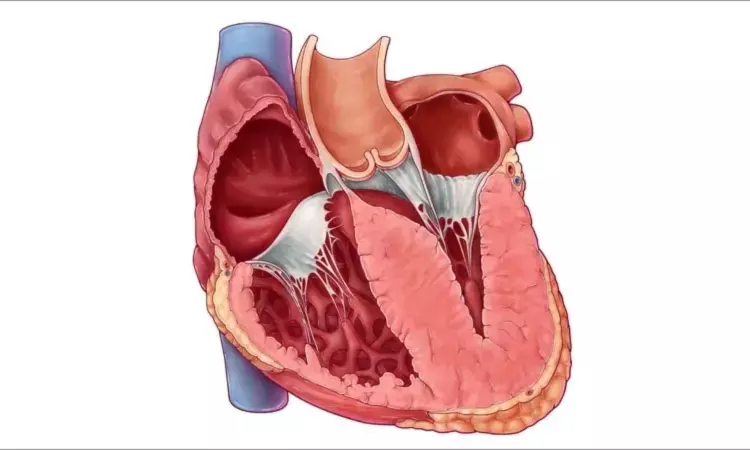- Home
- Medical news & Guidelines
- Anesthesiology
- Cardiology and CTVS
- Critical Care
- Dentistry
- Dermatology
- Diabetes and Endocrinology
- ENT
- Gastroenterology
- Medicine
- Nephrology
- Neurology
- Obstretics-Gynaecology
- Oncology
- Ophthalmology
- Orthopaedics
- Pediatrics-Neonatology
- Psychiatry
- Pulmonology
- Radiology
- Surgery
- Urology
- Laboratory Medicine
- Diet
- Nursing
- Paramedical
- Physiotherapy
- Health news
- Fact Check
- Bone Health Fact Check
- Brain Health Fact Check
- Cancer Related Fact Check
- Child Care Fact Check
- Dental and oral health fact check
- Diabetes and metabolic health fact check
- Diet and Nutrition Fact Check
- Eye and ENT Care Fact Check
- Fitness fact check
- Gut health fact check
- Heart health fact check
- Kidney health fact check
- Medical education fact check
- Men's health fact check
- Respiratory fact check
- Skin and hair care fact check
- Vaccine and Immunization fact check
- Women's health fact check
- AYUSH
- State News
- Andaman and Nicobar Islands
- Andhra Pradesh
- Arunachal Pradesh
- Assam
- Bihar
- Chandigarh
- Chattisgarh
- Dadra and Nagar Haveli
- Daman and Diu
- Delhi
- Goa
- Gujarat
- Haryana
- Himachal Pradesh
- Jammu & Kashmir
- Jharkhand
- Karnataka
- Kerala
- Ladakh
- Lakshadweep
- Madhya Pradesh
- Maharashtra
- Manipur
- Meghalaya
- Mizoram
- Nagaland
- Odisha
- Puducherry
- Punjab
- Rajasthan
- Sikkim
- Tamil Nadu
- Telangana
- Tripura
- Uttar Pradesh
- Uttrakhand
- West Bengal
- Medical Education
- Industry
Mavacamten Shows Promise in Reducing Need for Invasive Treatment in Hypertrophic Cardiomyopathy Patients

Patients with severely symptomatic obstructive hypertrophic cardiomyopathy (HCM) often face a challenging dilemma: whether to opt for invasive therapies or explore alternative medical treatments. Addressing this unmet need, a recent clinical trial published in JAMA Cardiology by Milind Y. Desai and colleagues have shed light on the potential of mavacamten, a novel medication, in improving left ventricular outflow tract (LVOT) gradient and symptoms in HCM patients, potentially reducing the need for immediate invasive interventions.
A double-blind, placebo-controlled, multicenter randomized clinical trial has demonstrated the cumulative longer-term impact of mavacamten on the requirement for septal reduction therapy (SRT) up to week 56. Conducted from July 2020 to November 2022, this study enrolled patients from 19 HCM centers in the United States. The trial included patients with obstructive HCM (New York Heart Association class III/IV) who were being considered for SRT due to their highly symptomatic condition.
In this trial, patients initially assigned to mavacamten continued the drug for 56 weeks, while those initially on placebo were crossed over to mavacamten from week 16 to week 56. Dose adjustments were guided by measurements of LVOT gradient and left ventricular ejection fraction (LVEF) using echocardiography.
The main outcome measured was the proportion of patients undergoing SRT, remaining eligible for SRT, or being unevaluable for SRT at week 56.
Here are the key findings from the study:
● The trial involved 112 patients with highly symptomatic obstructive HCM, of which 108 qualified for the week 56 evaluation. The mean age of participants was 60.3 years, with 50% being male.
● At week 56, 8.9% of patients in the mavacamten group and 19.2% in the placebo crossover group met the composite endpoint, indicating a reduced need for SRT in the mavacamten-treated group.
● After 56 weeks, the mavacamten group showed a sustained reduction in resting and Valsalva LVOT gradients when compared to the placebo-to-mavacamten group.
● NYHA class improvement of 1 or higher was observed in 93% of patients in the original mavacamten group and 73% in the placebo crossover group.
● 11.1% of patients had an LVEF less than 50%, but the majority continued treatment.
The results of the trial indicate that mavacamten could potentially offer a valuable therapeutic option for patients with symptomatic obstructive HCM. By reducing the need for SRT and demonstrating improvements in LVOT gradients and symptoms, mavacamten addresses a significant clinical need. However, given the potential risk of left ventricular systolic dysfunction, researchers emphasize the importance of continued close monitoring for patients undergoing this treatment.
As these findings open doors to a non-invasive approach for HCM patients, further research and longitudinal studies are essential to assess the long-term benefits and safety profile of mavacamten in managing symptomatic obstructive HCM.
Reference:
Desai, M. Y., Owens, A., Wolski, K., Geske, J. B., Saberi, S., Wang, A., Sherrid, M., Cremer, P. C., Lakdawala, N. K., Tower-Rader, A., Fermin, D., Naidu, S. S., Smedira, N. G., Schaff, H., McErlean, E., Sewell, C., Mudarris, L., Gong, Z., Lampl, K., … Nissen, S. E. (2023). Mavacamten in patients with hypertrophic cardiomyopathy referred for septal reduction: Week 56 results from the VALOR-HCM randomized clinical trial. JAMA Cardiology. https://doi.org/10.1001/jamacardio.2023.3342
Dr Kamal Kant Kohli-MBBS, DTCD- a chest specialist with more than 30 years of practice and a flair for writing clinical articles, Dr Kamal Kant Kohli joined Medical Dialogues as a Chief Editor of Medical News. Besides writing articles, as an editor, he proofreads and verifies all the medical content published on Medical Dialogues including those coming from journals, studies,medical conferences,guidelines etc. Email: drkohli@medicaldialogues.in. Contact no. 011-43720751


